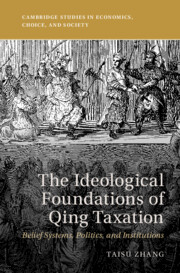Book contents
- The Ideological Foundations of Qing Taxation
- The Ideological Foundations of Qing Taxation
- Copyright page
- Dedication
- Contents
- Statistical Tables
- Preface
- Acknowledgments
- Introduction
- 1 A Short History of Qing Taxation
- 2 The Uses and Limitations of Rationalist Explanations
- 3 Pre-Qing Fiscal Regimes
- 4 The Early Qing Paradigm Shift
- 5 Mid-Qing Entrenchment
- 6 Late Qing Reforms
- 7 Theoretical Implications
- Conclusion
- Abbreviations of Sources
- References
- Index
2 - The Uses and Limitations of Rationalist Explanations
Published online by Cambridge University Press: 02 February 2023
- The Ideological Foundations of Qing Taxation
- The Ideological Foundations of Qing Taxation
- Copyright page
- Dedication
- Contents
- Statistical Tables
- Preface
- Acknowledgments
- Introduction
- 1 A Short History of Qing Taxation
- 2 The Uses and Limitations of Rationalist Explanations
- 3 Pre-Qing Fiscal Regimes
- 4 The Early Qing Paradigm Shift
- 5 Mid-Qing Entrenchment
- 6 Late Qing Reforms
- 7 Theoretical Implications
- Conclusion
- Abbreviations of Sources
- References
- Index
Summary
Chapter 2 considers and critiques a number of rationalist explanations for these developments, including geopolitics, financial necessity, administrative capacity, principal-agent problems, and potential collective action issues. It argues, first, that some combination of these factors is largely capable of explaining the Qing’s approach to nonagricultural taxation, which grew whenever the state faced significant fiscal pressure, but was subject to a number of political economy and administrative constraints that became increasingly apparent in the nineteenth century. The chapter then argues that these rationalist theories are unable to fully explain the stagnation of agricultural taxes from the early eighteenth century to the end of the nineteenth century, which suggests that ideological factors should be brought in to complete the picture.
Keywords
- Type
- Chapter
- Information
- The Ideological Foundations of Qing TaxationBelief Systems, Politics, and Institutions, pp. 76 - 124Publisher: Cambridge University PressPrint publication year: 2023

